Exactly How IPTV Works: Your Total Guide to Streaming Television Online
IPTV, or Net Procedure Tv, represents a significant shift in how we take in television web content, moving far from traditional broadcasting techniques to a more flexible, internet-based technique. By making use of a client-server version, IPTV makes it possible for individuals to access a vast range of programming with electronic packages sent over broadband connections. Nevertheless, comprehending the intricacies behind this innovation-- such as its elements, advantages, and various solution types-- can be critical for making notified selections in today's electronic landscape. As we explore these facets, the implications for your viewing experience might become also much more obvious.
What Is IPTV?
In the realm of electronic media, IPTV, or Net Protocol Tv, represents a transformative technique to delivering tv content. Unlike traditional broadcasting techniques, which depend on terrestrial, satellite, or cable television systems, IPTV uses net protocol to stream content straight to devices such as televisions, smartphones, and tablets. This modern technology enables individuals to access a wide array of programming via high-speed web connections, offering flexibility and convenience.
IPTV can be categorized into three main service designs: live tv, video on demand (VOD), and time-shifted tv. Live television permits individuals to enjoy programs in real-time, while VOD supplies accessibility to a collection of web content that can be viewed at the audience's convenience. Iptv. Time-shifted television makes it possible for audiences to watch programs at their preferred time, also if they initially aired online
In addition, IPTV commonly incorporates interactive attributes, such as electronic program overviews and video recording capacities, improving the viewing experience. As customers progressively demand individualized content and on-demand services, IPTV attracts attention as an engaging option, reshaping the television landscape and offering unprecedented alternatives for audiences worldwide.
Just How IPTV Functions
The seamless assimilation of technology and customer experience defines how IPTV operates. Net Procedure Tv (IPTV) delivers tv programs and various other multimedia content through web protocols, instead of traditional terrestrial, satellite, or wire formats. This procedure includes inscribing video material into digital packets that are transferred over a broadband web link.
IPTV generally uses a client-server model where content is saved on a web server and sent out to the individual's gadget-- such as a wise television, computer system, or mobile phone-- upon demand. The web content distribution is helped with via a set-top box or an application that translates the inbound data and offers it on the screen. Notably, IPTV operates an on-demand or real-time basis, permitting users to access a vast range of networks and programs.
A vital element of IPTV is its reliance on a robust broadband connection, which guarantees smooth streaming and premium video playback. Additionally, IPTV systems commonly include sophisticated functions such as electronic program overviews (EPGs), time-shifting, and video-on-demand (VOD), boosting the viewing experience. Overall, IPTV represents a considerable development in how visitors consume tv content, leveraging the power of the web for enhanced availability and versatility.
Advantages of IPTV
While conventional tv methods usually limit customer options and availability, IPTV offers numerous benefits that improve the total watching experience. One of the key benefits is the extensive selection of web content offered. Audiences can access a huge collection of channels, on-demand programs, and motion pictures, tailored to individual choices.
Additionally, IPTV sustains several devices, allowing users to stream web content on mobile phones, tablet computers, wise TVs, and computers. This adaptability ensures that customers can enjoy their favored programs anytime and anywhere, as long as they have a net connection. Furthermore, IPTV frequently features interactive aspects, such as rewind, document, and pause capabilities, providing customers with better control over their checking out habits.
Cost-effectiveness is one more notable benefit. Several IPTV services use affordable rates compared to typical cord subscriptions, frequently without long-lasting agreements or surprise charges. This price makes it much easier for customers to discover numerous networks and web content without significant financial commitments.
Lastly, IPTV normally boasts exceptional photo quality, consisting of high-definition and 4K choices, boosting the overall viewing experience. Jointly, these click for more info advantages make IPTV an engaging option for contemporary visitors looking for versatility, range, and quality in their enjoyment choices.
Kinds Of IPTV Provider
IPTV solutions can be classified right into numerous distinct types, each accommodating different audience requirements and preferences. The main categories consist of real-time tv, on-demand material, and time-shifted IPTV.
Real-time tv IPTV provides real-time streaming of broadcast networks, allowing viewers to enjoy programs as they air. This solution carefully looks like traditional cord TV, providing access to a series of networks, consisting of information, sports, and entertainment.
On-demand IPTV, on the various other hand, makes it possible for customers to choose and view content at their convenience. This consists of films, series, and documentaries that can be streamed whenever the customer selects, using adaptability and personalization.
Time-shifted IPTV combines elements of both real-time and on-demand services. It allows audiences to stop, rewind, or record live broadcasts, providing the capability to control their viewing experience. This solution is specifically useful for those with hectic timetables, as it accommodates audiences who may miss real-time programs.

Establishing IPTV
Setting up IPTV entails a number of essential steps to make certain a smooth viewing experience. You require a secure net link, ideally a broadband service with a minimum speed of 10 Mbps for typical meaning and at the very least 25 Mbps for high definition streaming. This guarantees minimal buffering and a smooth playback.
Next, choose an IPTV company. Research different choices, comparing their channel offerings, rates, and individual reviews. You usually obtain login qualifications and a web link to access the IPTV service. when you've selected a supplier.
To begin streaming, you'll need a suitable tool - Iptv. Many IPTV solutions can be accessed with Smart Televisions, streaming boxes like Roku or Amazon Fire television, computers, or mobile tools. Download the matching application or software program for your selected platform
After setup, visit using your qualifications and set up any type of required settings, such as parental controls or network choices. Connect your tool to your tv via HDMI, and you're ready to appreciate a broad range of channels and on-demand web content. Consistently check for software application updates to enhance efficiency and security, making sure an ideal IPTV experience.
Final Thought

IPTV, or Net Method Tv, represents a significant change in how we take in tv content, relocating away from traditional broadcasting methods to a much more versatile, internet-based method.In the world of electronic media, IPTV, or Internet Method Television, stands for a transformative method to supplying tv material.IPTV can be classified right into three key solution designs: real-time tv, video clip on demand (VOD), and time-shifted television. Net Procedure Television (IPTV) provides television shows and various other best site multimedia content through web procedures, instead than conventional terrestrial, satellite, or wire styles. On the whole, IPTV stands for a substantial evolution in just how viewers eat television material, leveraging the power of the net for enhanced availability and versatility.
Comments on “IPTV vs. Cable-- Which One is Right for You?”